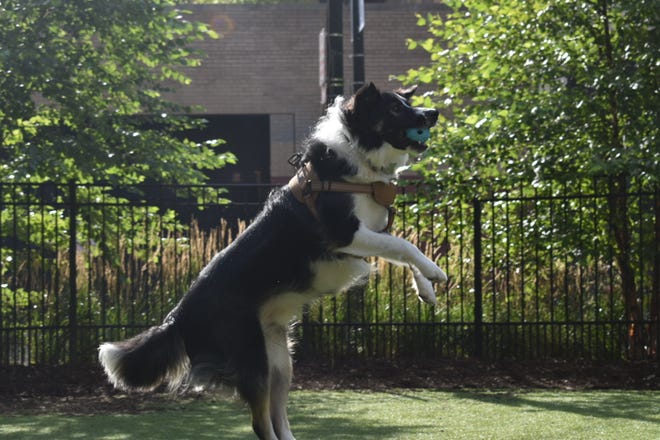
At the end of a stressful week for dog owners, many were relieved that the mystery canine illness identified in northern Michigan was confirmed to be parvovirus, a serious illness for which there is a vaccine.
Kari Beer, an emergency and critical care specialist with Oakland Veterinary Referral Services in Bloomfield Hills, said as long as a dog is up to date on routine care and vaccinations, they likely will be fine.
“The distemper combination vaccines, which is the one that pets typically get several boosters of when they’re a puppy, and then it’s usually repeated every year to three years depending on the dog’s age, does include the parvovirus vaccine,” Beer said.
Khusheu Mistry adopted her dog, Zar, during the COVID-19 pandemic and said even though it was a lengthy process to get an appointment during and after the shutdown, he is fully vaccinated, so she feels OK about the parvovirus outbreak now.
“I heard about it on Monday and everybody was kind of freaking out,” said Mistry, 27, of Detroit. “I think everyone was avoiding the dog park — I know I was. I still used it but only if nobody was in there just because they didn’t know what it was.”
Before the illness was identified as parvovirus, dog owners worried it was the start of a pandemic for dogs, which caused panic, Mistry said.
Kellen Collison similarly avoided taking his 2-year-old border collie Brody to the dog park, but wasn’t really surprised when the illness was identified as parvovirus.
“Looking at the symptoms, they kind of matched up with parvo,” the 30-year-old Detroit resident said.
Parvoviruses are spread through fecal oral contamination, so when unvaccinated or partially vaccinated dogs are outside and in contact with other canines or contaminated stool, there is a risk for spread, Beer said. This makes areas where dogs congregate, such as parks and boarding facilities, particularly high risk.
Becky Briskin almost canceled Pippa’s Grand Circus dog park playdate in downtown Detroit out of fear of the mystery virus this week. Upon finding out the outbreak was parvovirus, Briskin was relieved; her Welsh terrier is fully up to date on her vaccines.
“It’s nice to be able to meet up with a friend and have your dogs run around, so I do think the dog park has its place as long as you’re safe,” said Briskin, 36, of Detroit. “The dog park has been really great for us, especially during the pandemic when day cares were closed.”
Victoria Zahul, co-director of Boxer Haven Rescue who owns a boxer, said that during the height of the pandemic, many clinics were backed up for routine and emergency care. Her rescue had to pause intake to not overwhelm foster dog caretakers, and she worried they might have to take similar precautions to allow for quarantines to stop the spread of the parvovirus.
“Once the state reopened we started taking in dogs again, but we did face quite a big struggle with getting vet care in a timely manner,” she said.
Beer agreed and said Oakland Veterinary Referral Services has been busy throughout the pandemic and often still is at capacity.
For Tina Lewandowski, who owns a 7-year-old rescue dog named Denny, the past week has been nerve-racking. Denny has a sensitive stomach and can sometimes exhibit symptoms that mimic parvovirus.
“They weren’t exactly sure what it was because they thought it was parvo … but testing negative,” she said. “I did reach out to my vet, I knew that he (Denny) was up to date on everything, but I just wanted to double check.”
Point-of-care tests for parvovirus in clinics and shelters up north were coming back negative for infected dogs earlier. The virus was only identified after more sensitive diagnostic testing was performed by Michigan State University’s veterinary diagnostic lab. Beer likened the process to COVID-19 testing and encouraged dog owners to get their pet checked if they appear to be sick.
“Sometimes we test ourselves (for COVID) at home and our screening test is negative, but then you go get a PCR and it’s positive,” she said “So the same thing can be true for any kind of viral infection.”
Beer added that she sees an uptick in parvovirus cases during the summer at the clinic, but she doesn’t know why these have not led to outbreaks like the one in northern Michigan.
Some dog owners, like Dean Dreon, were less concerned about the virus and prioritized their pet’s socialization and exercise. While Dreon heard people talking about the parvovirus outbreak, his Australian shepherd mix, Carter, has all his vaccinations and needs places like the dog park.
“If I were to keep him inside and away from other dogs for a day or two he’d just lose his mind,” Dreon said.
Sheri Grace, a veterinary technician and office manager for Macomb Center Veterinary Hospital, said that most clientskeep their dogs up to date on vaccines, which are required for many dog parks, day cares and boarding facilities.
“As long as your pets are vaccinated and you use caution … they should be fine,” she said.
hmackay@detroitnews.com
@hmackayDN